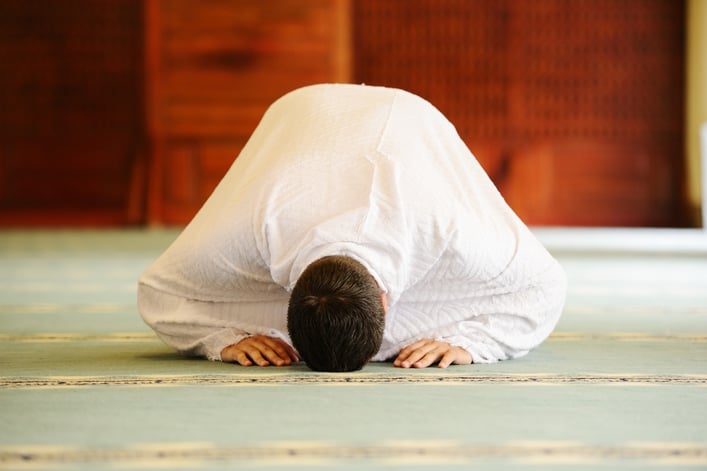(Note: The following article was compiled by a student with the intention of helping others learn basic words and terms. If there are any errors, or words you think should be added, please leave a comment below. JazakumAllahu khayran!)

If you're new to Islam, or have Muslim friends, chances are that you've heard them say words or phrases that may be foreign to you. Here is a compilation of 50 of those terms, their meaning, and some examples of when they may be used.
- Adab = "Etiquette," or "good manners"
- Adhan = Call to prayer made at the beginning of a prayer window
- Adkar (pl. dhikr) = The remembrance of Allah via a word, phrase, or verses from the Qur'an. Examples include verses of Qur'an, and the phrases said after prayer (SubhanAllah, Alhamdulillah, Allahu Akbar)
- Akhira = The afterlife, where we will exist eternally
- Alayhi salam = A prayer meaning, "Peace be upon him." Said after mentioning the name of a Prophet of Allah.
- Alhamdulillah = All praise and thanks belong to Allah. Commonly used in response to "How are you?," after good news, or even after something bad happens with the meaning that things could have been worse.
- Allah = God, though it encompasses all of His Names and Attributes
- Allahu Akbar = God is Greater. Said in between movements during prayer, but can also be used in response to good news, acknowledging God's prevalence over all things.
- Asalam alaikum = peace be upon you. Said to other Muslims in greeting.
- Astaghfirullah = I seek forgiveness from Allah. Said after committing a sin or mistake.
- Awrah = Usually refers to parts of the body that should be covered.
- Ayah = (pl. "ayat") "sign," usually synonymous to a verse of Qur'an
- Basmala = Saying "Bismillahi Rahman ir-Rahim." Usually said during Qur'anic recitation.
- Bismillah = Saying "Bismillah," meaning, "In/With the name of Allah." Said before eating, drinking, and entering the house among other things.
- Dunya = This worldly life
- Eid = Festival, celebration. Commonly refers to the two Eid holidays "Eid al-Fitr" (after Ramadan), and "Eid al-Adha" (10th day of Dhul-Hijjah)
- Hadith = a collection of words, actions, and the silent approval of Prophet Muhammad
- Hajj = Pilgrimage to the Ka'aba in Mecca
- Halal = "Permissible," usually used in reference to meat or acts
- Haram = "Forbidden," usually used in reference to meat or acts. It can also be used in reference to sacred places, like Masjid al-Haram. This is because things that can be permissible elsewhere are haram there, like cutting a plant.
- Hijab = Usually refers to the head covering worn by Muslim women
- Hijra = "Migration," usually referring to the migration from Mecca to Medina the Prophet made
- Inna lillahi wa inna ilayhi rajiun = To God we belong and to God we will return. Said in response to learning about someone's death or the loss of anything
- InshaAllah = "If God wills," usually said when discussing future plans or goals to acknowledge how uncertain we are about our futures
- Jahannam = Hell
- Jannah = Heaven
- JazakAllahu khayran = "May Allah give you much good," said as an alternative to "thank you." When addressing a female, say, "jazakillahu khayran."
- Jihad = "Struggle," which can be different for each person
- Jumu'ah = Friday prayer during the time of Zhuhr that entails a khutbah (sermon) and two rak'at of prayer.
- Ka'aba = The first place of worship on Earth constructed by Prophet Ibrahim and Isma'il
- Khutbah = "Sermon" that usually happens on Friday
- Kitab = "Book." Can be used while referring to the Qur'an
- La ilaha illa Allah = "There is no deity worthy of worship other than Allah." A statement of monotheism, though it can also be used in response to hearing good/bad news.
- MashaAllah = "What God has willed," said in response to good news or as a way to praise someone.
- Mushaf = Another way of referring to the Qur'an. Comes from "suhuf," which means pages or sheets
- Niqab = A face veil worn by some Muslim women
- Qibla = Direction of the Ka'aba that Muslims face when praying
- Qur'an = The last revelation sent to mankind.
- RadiAllahu anhu = "May Allah be pleased with him," said after mentioning the name of a companion of the Prophet. For a female companion, say "RadiAllahu anha"
- Rasulullah = "Messenger of Allah," referring to a Prophet that was given revelation
- Salla Allahu alayhi wa salam = "May peace and blessings be upon him," said after mentioning the Prophet. Usually shortened as "SAW" or "PBUH."
- Sawm = "Fasting," where one abstains from eating, drinking, and intercourse from Fajr to Maghrib.
- Seerah = "Biography," usually referring to the biography of the Prophet
- Shahada = "Testimony," usually referring to the testimony of faith: "Ash-hadu an la ilaha illa Allah, wa ash-hadu an-na Muhammad rasul-ullah" (I bear witness that there is no deity worthy of worship except Allah, and that Muhammad is his Messenger). The shahada is said when someone converts to Islam, but is also reaffirmed throughout the day during prayer.
- Sharia = "Law," according to the teachings of Islam.
- Shaytan = "Satan"
- SubhanAllah = Usually translated as "Glory be to Allah," but is a declaration of Allah being free from any imperfections or defects. Usually said in response to being amazed.
- Sunnah = "Tradition," or "way." Usually refers to the teachings of the Prophet
- Taqabal Allah = "May Allah accept," usually said after the completion of an act
- Tawfeeq = Usually translated as "success." Usually said in wishing someone success with what they set out to do.
- Wu'du = "Ablution" which is to be performed before prayer, and before touching a physical copy of the Qur'an



